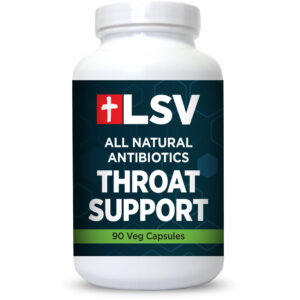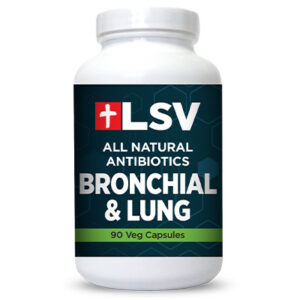Our Company
LSV
SINCE 1992
Founded in 1992, in Winter Park, Florida – LSV Vitamins has been the leader in All Natural Antibiotic supplement sales for over 30 years in the United States.

Garlic, a staple in kitchens worldwide, has been celebrated not only for its distinctive flavor but also for its numerous health benefits. One of the most intriguing properties of garlic is its potent antibiotic effects. For centuries, this aromatic herb has been used across various cultures as a natural remedy to combat infections and promote overall well-being.
The key player responsible for garlic’s antibiotic prowess is allicin, a sulfur-containing compound released when garlic is crushed or chopped. Allicin is not present in fresh garlic but is produced when the enzyme alliinase is activated upon the breakdown of alliin, a sulfur-containing amino acid found in garlic cloves. This chemical reaction occurs when garlic is crushed or minced, releasing allicin and imparting the characteristic pungent aroma.
Research has shown that allicin possesses powerful antibacterial properties. It has the ability to inhibit the growth of a wide range of bacteria, including some strains that have become resistant to conventional antibiotics. Allicin works by disrupting the bacterial cell membrane, leading to the impairment of vital cellular functions and ultimately causing the death of the bacteria.
In addition to its antibacterial properties, garlic has demonstrated antiviral effects, making it a potential weapon against various viral infections. Studies have suggested that garlic extracts may be effective against viruses such as influenza, herpes simplex, and human immunodeficiency virus (HIV). While further research is needed to fully understand the extent of garlic’s antiviral capabilities, these findings highlight its potential as a natural antiviral agent.
Garlic’s antibiotic properties extend to the fungal kingdom as well. Allicin has been shown to exhibit antifungal activity against various fungal species, including Candida albicans, a common cause of yeast infections. This suggests that garlic may play a role in preventing and treating fungal infections, offering a natural alternative to conventional antifungal medications.
Beyond its direct antimicrobial effects, garlic is known to stimulate the immune system. The compounds found in garlic, including allicin, can enhance the activity of immune cells, such as macrophages and lymphocytes, thereby improving the body’s ability to fend off infections.
Garlic’s antibiotic properties, primarily attributed to the presence of allicin, make it a valuable natural remedy in the fight against bacterial, viral, and fungal infections. While garlic cannot replace traditional medical treatments, incorporating it into a balanced diet may contribute to overall health and well-being. As we continue to explore the potential of natural remedies, garlic stands out as a flavorful ally in supporting the body’s defense mechanisms against a myriad of pathogens.
 Throat Support - Natures Antibiotics
Throat Support - Natures Antibiotics
 Bronchial & Lung Support - Natures Antibiotics
Bronchial & Lung Support - Natures Antibiotics
LSV
SINCE 1992
Founded in 1992, in Winter Park, Florida – LSV Vitamins has been the leader in All Natural Antibiotic supplement sales for over 30 years in the United States.